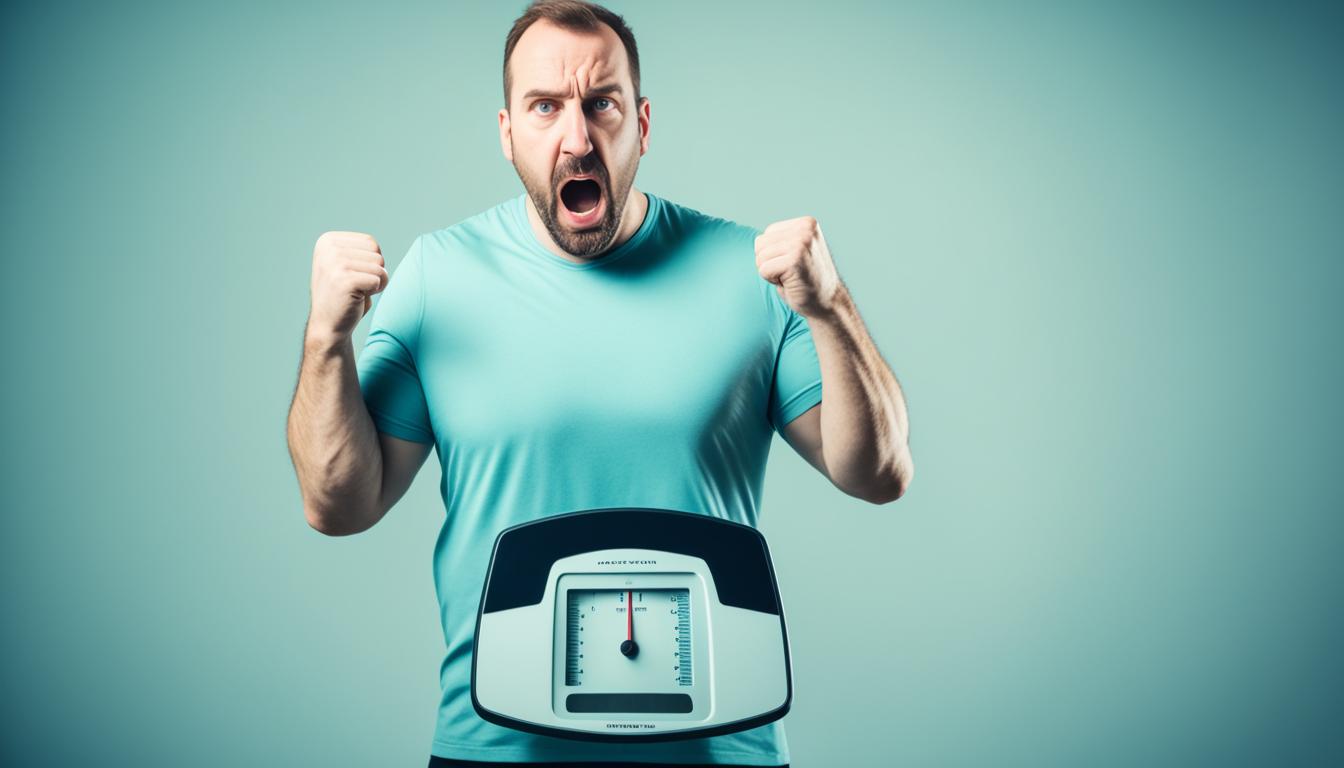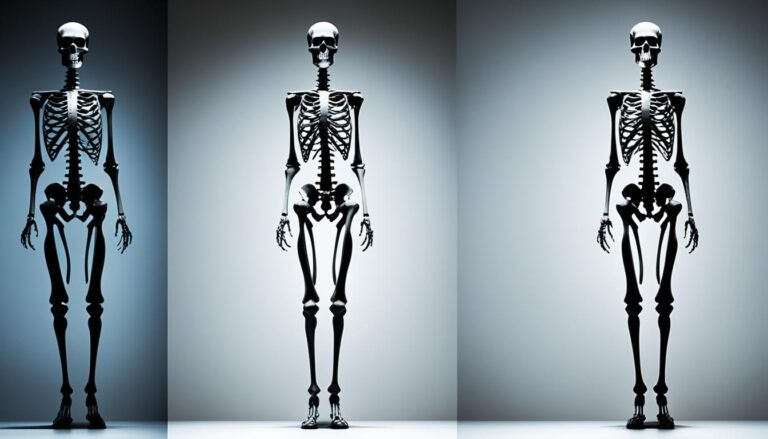What is the hardest stage of weight loss?
When it comes to weight loss, there are different stages that individuals go through on their journey to achieving their goals. While each stage has its own unique challenges, there is one particular stage that is often considered the most difficult. This stage is known as the plateau stage.
During this stage, individuals often experience a slowdown in their weight loss progress. This can be frustrating and demotivating, as it feels like all their hard work is not yielding the desired results. Understanding why this stage is so challenging can help individuals navigate through it more effectively.
Key Takeaways:
- The plateau stage of weight loss is often considered the most difficult.
- During this stage, individuals experience a slowdown in weight loss progress.
- Understanding the factors contributing to the plateau stage can help navigate through it more effectively.
- Reevaluating weight loss goals, focusing on meal size, incorporating strength-building exercises, and managing calorie intake and stress levels are strategies to overcome the plateau.
- Maintaining muscle mass and prioritizing overall health are crucial for sustainable weight loss.
How does weight loss plateau occur?
The weight loss plateau is a common occurrence in weight loss journeys. When your body registers that it is losing weight, it triggers physiological responses to protect against the perceived threat. These responses include reducing metabolic rate, burning less energy, and increasing the production of an appetite hormone called ghrelin.
“Weight loss plateaus can be frustrating, but they’re a sign your body is adapting to the changes. It’s important to remember that weight loss is not linear, and everyone experiences ups and downs along the way.” – Dr. Emily Jones, Weight Loss Specialist
The weight loss plateau can occur anywhere between three and six months of weight loss, and it often leads to overcoming weight loss challenges and weight loss struggles. Breaking through this plateau requires modifying your approach to weight loss.
To understand how to overcome the weight loss plateau, it’s crucial to recognize that weight loss is a complex process influenced by various factors. These can include genetics, lifestyle habits, and the specific weight loss methods you’re following. By identifying and addressing the underlying reasons for your plateau, you can restart your weight loss progress and achieve your goals.
Factors contributing to weight loss plateau:
- Metabolic adaptation: As your body weight decreases, your metabolism slows down, resulting in decreased calorie expenditure.
- Hormonal changes: The hormone leptin, responsible for regulating hunger and energy expenditure, adapts to lower calorie intake, increasing appetite and reducing energy expenditure.
- Muscle loss: During weight loss, some muscle mass may be lost, which can impact your metabolic rate.
- Decreased physical activity: As you lose weight, everyday activities require less effort, leading to decreased calorie burn.
To successfully overcome the weight loss plateau, a multifaceted approach is necessary. This includes a combination of dietary adjustments, exercise modifications, and lifestyle changes. By implementing the following strategies, you can break through the plateau and continue your weight loss journey:
Strategies to break through the weight loss plateau:
| Strategy | Description |
|---|---|
| 1. Adjust Your Caloric Intake | Reevaluate your daily caloric intake and determine if adjustments are necessary for continued weight loss. |
| 2. Increase Physical Activity | Incorporate strength training exercises to build lean muscle mass, boost metabolism, and increase overall calorie burn. |
| 3. Manage Stress Levels | Implement stress management techniques such as meditation, yoga, or relaxation exercises to minimize the impact of stress on weight loss progress. |
| 4. Prioritize Quality Sleep | Ensure you’re getting enough restful sleep as inadequate sleep can impact metabolism and increase cravings. |
| 5. Review and Adjust Your Weight Loss Plan | Assess your current weight loss plan and make necessary modifications to keep your body challenged and prevent adaptation. |
Breaking through the weight loss plateau requires perseverance, patience, and a holistic approach. By continuing to make gradual lifestyle changes, you can overcome the challenges that come with the weight loss journey and achieve lasting results.
Tips for Breaking Through the Weight Loss Plateau
To successfully break through the weight loss plateau, it’s important to implement effective strategies that address the obstacles in your weight loss journey. Here are some tips to help you overcome these barriers and achieve your weight loss goals:
- Reevaluate Your Weight Loss Goal: Take a moment to reassess your weight loss target and consider whether it is necessary to lose those last few pounds. Sometimes, adjusting your goal to focus on overall health and well-being can provide a fresh perspective and motivation to keep going.
- Prioritize a Nutritious Breakfast: Start your day with a balanced and filling breakfast. This will not only provide you with essential nutrients but also help regulate your appetite throughout the day. Include foods that are high in fiber, protein, and healthy fats to keep you satisfied and energized.
- Incorporate Strength-Building Exercises: Engage in regular strength-building exercises to preserve muscle mass and boost your metabolism. Lifting weights, resistance training, or bodyweight exercises can help you build lean muscle, which burns more calories even at rest.
- Review and Adjust Your Calorie Intake: It’s crucial to monitor your calorie intake and make necessary adjustments. As your weight decreases, your body’s calorie needs also change. Consult with a registered dietitian or nutritionist to evaluate your current calorie intake and make modifications as needed.
- Manage Stress Levels: Stress can interfere with your weight loss progress by triggering emotional eating and hormonal imbalances. Incorporate stress management techniques such as meditation, yoga, or deep breathing exercises into your daily routine to help manage stress and prevent it from derailing your weight loss efforts.
By implementing these tips and staying committed to your weight loss journey, you can overcome the obstacles of the weight loss plateau and continue to make progress towards your goals.

The Stages of Losing Weight and Fat Loss
When embarking on a weight loss journey, it’s important to understand that weight loss occurs in two stages. Each stage plays a significant role in achieving your goals and maintaining a healthy lifestyle.
The First Stage: Rapid Weight Loss
In the initial stage of weight loss, you may experience rapid and noticeable changes on the scale. However, it’s important to note that this initial weight loss is primarily attributed to water loss rather than fat loss. During this stage, your body releases stored glycogen, which holds water, resulting in a significant drop in weight.
Achieving rapid weight loss can serve as a powerful motivator and encourage you to continue your journey. However, it’s crucial to keep in mind that sustaining this level of weight loss is not sustainable in the long run. The key is to focus on progressing to the next stage where fat loss becomes the main objective.
The Second Stage: Fat Loss
Once you’ve surpassed the initial stage of rapid weight loss, you’ll transition into the second stage, where fat loss takes precedence. This stage is characterized by a slower rate of weight loss as the body begins to metabolize and burn stored fat for energy.
Unlike the initial stage, where the weight loss was primarily from water, fat loss is a more sustainable and healthier goal to pursue. By losing fat instead of just overall weight, you can improve your body composition, boost metabolism, and enhance overall well-being.
It’s important to emphasize that during the fat loss stage, preserving muscle mass should be a priority. Muscle is metabolically active and helps increase your metabolism, enabling you to burn more calories even at rest. Incorporating strength training exercises into your routine can help preserve and build lean muscle mass, optimizing your weight loss journey.
Understanding the Difference: Weight Loss vs. Fat Loss
While weight loss and fat loss are often used interchangeably, they have distinct meanings. Weight loss refers to a decrease in overall body weight, which can be a combination of water, muscle, and fat. On the other hand, fat loss focuses specifically on reducing body fat while preserving muscle mass.
In the pursuit of a healthy body, it’s essential to prioritize fat loss rather than simply aiming to decrease overall weight. By focusing on fat loss, you can achieve a higher level of fitness, improve body composition, and enhance your overall health.
| Weight Loss Stage | Characteristics | ||
|---|---|---|---|
| Rapid Weight Loss | – Primarily due to water loss | – Motivating phase | |
| Fat Loss | – Slower rate of weight loss | – Focuses on burning stored fat | – Preserving muscle mass is crucial |
Conclusion
Losing weight and achieving your weight loss goals is a challenging journey, especially during the final stages. However, with a clear understanding of the weight loss process and the implementation of sustainable habits, you can overcome these hardships.
When embarking on a weight loss journey, it’s important to remember that the focus should not solely be on the number on the scale. Instead, prioritize overall health and well-being. This means adopting a lifestyle that includes regular exercise, a balanced diet, and effective stress management.
Maintaining a healthy weight requires a long-term commitment to sustainable weight loss practices. By making gradual, yet consistent changes to your daily routine, you can ensure that your weight loss is manageable and lasting. Additionally, incorporating strength-building exercises and focusing on preserving muscle mass can help boost your metabolism and aid in weight loss maintenance.
In conclusion, sustainable weight loss is achieved by understanding the weight loss process, adopting healthy habits, and prioritizing overall well-being. While the road may be challenging, the rewards of improved health and self-confidence are well worth the effort. Take the first step towards your weight loss goals today, and remember that maintaining a healthy lifestyle is crucial for long-term success.
FAQ
What is the hardest stage of weight loss?
The hardest stage of weight loss is generally the final stage, where the last few pounds are the most difficult to lose due to a decrease in calorie expenditure and an increase in appetite.
How does weight loss plateau occur?
Weight loss plateau occurs when your body adjusts to losing weight by reducing metabolic rate, burning less energy, and increasing the production of the appetite hormone ghrelin. This can happen between three and six months of weight loss.
What are some tips for breaking through the weight loss plateau?
To break through the weight loss plateau, consider reevaluating your weight loss goal, focus on meal size throughout the day, incorporate strength-building exercises, review and adjust your calorie intake, and manage stress levels.
What are the stages of losing weight and fat loss?
Weight loss generally occurs in two stages – rapid weight loss due to water loss, followed by slower weight loss primarily from fat loss. Maintaining muscle mass and focusing on overall health are crucial during the weight loss process.
How can I maintain weight loss in the long term?
To maintain weight loss in the long term, it is important to adopt a healthy lifestyle that includes regular exercise, a balanced diet, and stress management. Focusing on overall health rather than just the number on the scale is key to sustainable weight loss maintenance.
Source Links
- https://theconversation.com/weight-loss-heres-why-those-last-few-pounds-can-be-hardest-to-lose-according-to-science-140150
- https://www.healthyfood.com/advice/the-last-5-kilos-really-are-the-hardest-to-lose-heres-why-and-what-you-can-do-about-it/
- https://www.healthline.com/nutrition/weight-loss-stages






